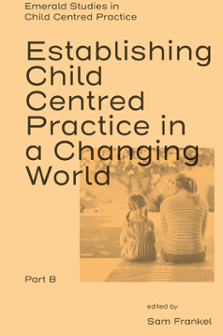
Index
Establishing Child Centred Practice in a Changing World, Part B
ISBN: 978-1-80455-941-3, eISBN: 978-1-80455-940-6
Publication date: 9 June 2023
Citation
(2023), "Index", Frankel, S. (Ed.) Establishing Child Centred Practice in a Changing World, Part B (Emerald Studies in Child Centred Practice), Emerald Publishing Limited, Leeds, pp. 231-235. https://doi.org/10.1108/978-1-80455-940-620231016
Publisher
:Emerald Publishing Limited
Copyright © 2023 Sam Frankel. Published under exclusive licence by Emerald Publishing Limited
INDEX
- Prelims
- Chapter 1 Extending the Conversation
- Chapter 2 Children's Voices in Early Childhood Education and Care
- Chapter 3 Children's Voice in Praxiological Transformation
- Chapter 4 Using Pupil Views Templates to Explore Children's Experiences of Teaching and Learning
- Chapter 5 Engaging Authentic Pupil Voice in Schools
- Chapter 6 Hearing Children's Voices in the Forest
- Chapter 7 Young Children's Participation in Homeschooling During the Covid-19 Pandemic: A Reflective Case Study From England
- Chapter 8 Reclaiming Agency: A Social Pedagogical Orientation to Child-Centred Practice
- Chapter 9 Co-Production in Creative Design to Amplify Childhood Voices of Parental Separation
- Chapter 10 Children's Perceptions of Participation Within Their Families: Listening to Children of Bolivian Families Living in Madrid
- Chapter 11 Children and Negotiation of Family Rules in Ibadan, Nigeria
- Chapter 12 Shared Decision-Making Processes in a Contemporary Urban Art Project and Its Impact on Children
- Chapter 13 The ‘Added Value’ of the Youth Contribution and the Call of Young People for Intergenerational Partnerships: Reflections From the 2021 World Congress for Justice With Children
- Chapter 14 Youth Political Participation in the Canadian Senate: Discussions With the Vote 16 Steering Group
- Chapter 15 Childhood Participation in Chile: Debts and Opportunities From Child Protagonism
- Index